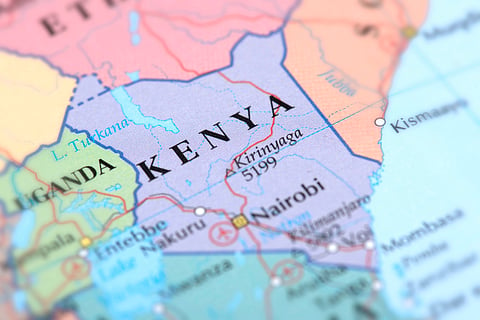

An earlier version of this article mentioned that the Climate Investment Funds (CIF)'s lenders included the International Monetary Fund’s (IMF) Resilience and Sustainability Facility (RSF). The CIF is, in fact funded by sovereign donors including the US, UK, Canda and others. We regret the error.
Kenya’s recent downgrade by Moody’s, a leading global credit rating agency and the potential for similar action by capital market companies S&P Global and Fitch Ratings, are likely to significantly impact the East African nation’s ability to secure favourable loan terms, including climate finance.
Like many climate-vulnerable African countries, Kenya has relied on its strong credit rating to access various low-interest climate-related funding programmes, securing billions of shillings for budgetary support.
This year alone, Kenya secured over $621.4 million (some already disbursed) from the Climate Investment Funds (CIF), a multilateral climate fund that includes the United States, United Kingdom, Canada, and other countries.
The RSF is a key source of climate finance, but like other IMF programmes and those of other global lenders, it considers creditworthiness based on ratings from agencies like Moody’s, S&P and Fitch. These ratings assess a country’s ability to repay debts and influence the terms of financial assistance.
While some experts and governments criticise these ratings as biased and unimportant, they are highly influential for global investors and lenders who lack access to in-depth data on individual borrowing nations.
Funds from the RSF and similar facilities have often replaced previous budgetary allocations for climate-related infrastructure projects, such as clean energy development and afforestation initiatives. They have also sometimes been used to stimulate private sector green investments, unlocking further government resources.
“The RSF resources will help to bolster the financial year 2023/24 budgetary allocations for investments in ongoing renewable energy projects, enhancements in the coverage and dissemination of Kenya's early warning systems, restoration efforts under the National Forest Action Plan and the National Tree Planting Campaign and the construction of climate-related infrastructure through the National Irrigation Development Project,” stated the IMF last year when extending the facility to Kenya.
Moody’s downgrade and its implications
In a statement, Moody’s explained their downgrade decision, citing Kenya’s withdrawal of the controversial 2024 Finance Bill. The agency expressed concerns that, given recent violent protests, the Kenyan government is unlikely to introduce significant revenue-raising measures in the near future. This, they predict, will lead to a slower reduction in the fiscal deficit and hinder Kenya’s debt affordability.
“Moody’s Ratings has today downgraded Kenya's (Kenya) local and foreign-currency long-term issuer ratings and foreign-currency senior unsecured debt ratings to Caa1 from B3. The outlook remains negative. The downgrade of Kenya’s rating reflects significantly diminished capacity to implement revenue-based fiscal consolidation that would improve debt affordability and place debt on a downward trend,” reads the statement.
The statement further highlighted that “the government’s decision not to pursue planned tax increases and instead rely on expenditure cuts to reduce the fiscal deficit represents a significant policy shift with material implications for Kenya’s fiscal trajectory and financing needs.”
Climate finance and the path forward
While accessing climate finance from the IMF and other international organisations is generally straightforward and offers low interest rates, the disbursed funds come with strict conditions. The Kenyan government, whose public debt currently stands at 68 per cent of the gross domestic product (GDP) — exceeding the World Bank and IMF’s recommended threshold of 55 per cent — sought IMF support to meet revenue targets.
The IMF’s bailout programme included comprehensive economic reforms aimed at increasing revenue collection to 25 per cent of GDP and alleviate the debt burden.
“The IMF team and the Kenyan authorities have reached a staff-level agreement on a comprehensive policy package needed to complete the seventh review of Kenya's economic programme under the Extended Fund Facility and Extended Credit Facility arrangements. The policy package seeks to preserve debt sustainability and price stability, manage fiscal risks, address financial sector vulnerabilities and AML/CFT deficiencies while continuing to advance structural reforms to support inclusive and resilient growth,” stated the IMF regarding Kenya’s bailout programme.
The IMF further noted the need for a substantial upfront fiscal adjustment in 2024-25 to reduce the debt burden. To achieve this, the Kenyan authorities initially introduced several measures in the draft 2024-25 Budget and the 2024 Finance Bill.
"Progress on the climate agenda under the RSF remains strong. The reforms will also create an enabling environment for attracting climate finance. Efforts are underway to increase access to global climate funds and leverage private climate finance through various channels, including collaborating with development partners to design a green climate fund for local government-level climate investments and a Sustainable Development Bond,” the IMF noted.
However, in response to violent and deadly protests, the Kenyan government cancelled the planned tax increases included in the 2024 Finance Bill. These measures were initially intended to raise KES346 billion, or 1.9 per cent of GDP.
Given the current social climate and foreseeable future, Moody’s stated that their previous assumption regarding the government’s capacity to implement revenue-raising measures is no longer valid. Importantly, an expenditure-based fiscal consolidation path will provide significantly less support for debt affordability, Kenya’s main credit weakness.
“Overall, even considering tax measures implemented outside the 2024 Finance Bill, debt affordability will deteriorate due to an increase in interest payments,” stated Moody’s.
Experts say Kenya must demonstrate strong fiscal discipline, implement effective economic reforms and seek diverse funding sources to address these challenges.
Mohamed Wehliye, a Kenyan central banker and finance expert, said enhanced fiscal management and credible efforts to stabilise the economy will be critical in restoring investor confidence and accessing the climate finance needed to support the country’s development goals.
“Too much emphasis on revenue was bound to cause problems. The only solution to the problem at this time is to renegotiate the IMF programme and reset the budget,” said Wehliye, adding that cutting spending rather than increasing revenue was also an option, even though both paths can lead to consolidation.